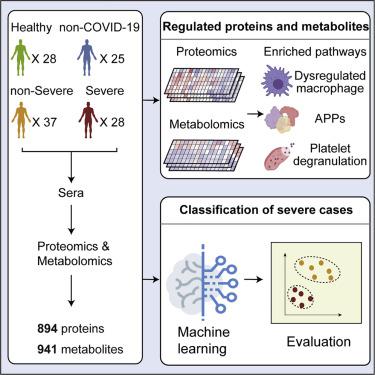Cell ( IF 45.5 ) Pub Date : 2020-05-28 , DOI: 10.1016/j.cell.2020.05.032 Bo Shen 1 , Xiao Yi 2 , Yaoting Sun 2 , Xiaojie Bi 1 , Juping Du 1 , Chao Zhang 3 , Sheng Quan 3 , Fangfei Zhang 2 , Rui Sun 2 , Liujia Qian 2 , Weigang Ge 2 , Wei Liu 2 , Shuang Liang 2 , Hao Chen 2 , Ying Zhang 1 , Jun Li 1 , Jiaqin Xu 1 , Zebao He 1 , Baofu Chen 1 , Jing Wang 1 , Haixi Yan 1 , Yufen Zheng 1 , Donglian Wang 1 , Jiansheng Zhu 1 , Ziqing Kong 3 , Zhouyang Kang 3 , Xiao Liang 2 , Xuan Ding 2 , Guan Ruan 2 , Nan Xiang 2 , Xue Cai 2 , Huanhuan Gao 2 , Lu Li 2 , Sainan Li 2 , Qi Xiao 2 , Tian Lu 2 , Yi Zhu 2 , Huafen Liu 3 , Haixiao Chen 1 , Tiannan Guo 2

|
Early detection and effective treatment of severe COVID-19 patients remain major challenges. Here, we performed proteomic and metabolomic profiling of sera from 46 COVID-19 and 53 control individuals. We then trained a machine learning model using proteomic and metabolomic measurements from a training cohort of 18 non-severe and 13 severe patients. The model was validated using 10 independent patients, 7 of which were correctly classified. Targeted proteomics and metabolomics assays were employed to further validate this molecular classifier in a second test cohort of 19 COVID-19 patients, leading to 16 correct assignments. We identified molecular changes in the sera of COVID-19 patients compared to other groups implicating dysregulation of macrophage, platelet degranulation, complement system pathways, and massive metabolic suppression. This study revealed characteristic protein and metabolite changes in the sera of severe COVID-19 patients, which might be used in selection of potential blood biomarkers for severity evaluation.
中文翻译:

COVID-19患者血清的蛋白质组学和代谢组学表征。
重症COVID-19患者的早期发现和有效治疗仍然是主要挑战。在这里,我们对46个COVID-19和53个对照个体的血清进行了蛋白质组学和代谢组学分析。然后,我们从18名非严重和13名严重患者的训练队列中,使用蛋白质组学和代谢组学测量结果来训练机器学习模型。使用10名独立患者对模型进行了验证,其中7名已正确分类。在19名COVID-19患者的第二个测试队列中,采用了靶向蛋白质组学和代谢组学测定方法来进一步验证该分子分类器,从而得出16个正确的任务。与其他组相比,我们确定了COVID-19患者血清中的分子变化,这表明巨噬细胞功能失调,血小板脱颗粒,补体系统途径和大量代谢抑制。











































 京公网安备 11010802027423号
京公网安备 11010802027423号